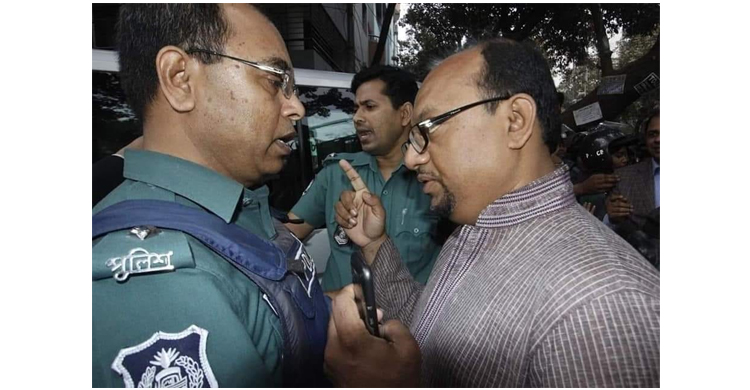Staff Reporter: In the political history of Bangladesh, October 29 marks a significant chapter. The day is commemorated in BNP’s history as “BNP Preservation Day” — recalling the turbulent year of 2007, when the party stood on the brink of destruction due to a deep political conspiracy targeting its leadership and ideology. At that critical juncture, veteran politician, Ekushey Padak-winning language movement hero, and seasoned leader Advocate Khandaker Delwar Hossain saved the party from collapse through his unwavering courage and steadfast principles. During the caretaker government’s rule, when political activities were banned, arrests were rampant, and efforts were made to divide the BNP, an internal drama unfolded on October 29, 2007. Under the banner of so-called “reformists,” a move was made to form an illegal committee as part of the “Minus Khaleda Zia” formula. The motive was clear — to weaken BNP’s leadership and transform it into a controllable political force.


According to political analysts, during the state of emergency, the army-backed interim administration sought to neutralize the leadership of both major parties — through “Minus Sheikh Hasina” in the Awami League and “Minus Khaleda Zia” in the BNP — effectively removing both leaders from politics. In this context, some senior BNP leaders, under direct or indirect pressure from the then-government, initiated moves to reorganize the party leadership. Party sources claim that several Standing Committee members were coerced or intimidated into attending a secret meeting of the reformist group. The meeting took place at the Gulshan residence of the late Finance Minister Saifur Rahman, “Jalalabad House.” At that time, then-Secretary General Khandaker Delwar Hossain was repeatedly pressured and threatened to join the meeting. He was told, “You will be killed and your family will be destroyed.” But Delwar Hossain ignored the threats and stood firm in loyalty to the party’s ideology and to Chairperson Begum Khaleda Zia. He left the hospital secretly, went into hiding, and refused to attend the meeting — thereby foiling the reformists’ conspiracy. His lone act of defiance saved the BNP from division and rendered the “Minus Formula” a complete failure. Political commentators regard this as one of the most remarkable examples in Bangladesh’s political history — a moment when a leader, guided by conscience and principle, safeguarded his party and its ideals. Under Khandaker Delwar Hossain’s leadership, the core structure of the BNP survived. The central leadership was reorganized before the 2008 general elections. Many researchers believe that if Delwar Hossain had chosen differently that day, Bangladesh’s political landscape would have been drastically altered — the BNP might have lost its existence, and the nation’s political balance might have taken a very different turn. Even today, BNP leaders and activists believe that the party’s revival was made possible by Delwar Hossain’s wisdom, prudence, and courage. Many also believe that his brand of strong and principled leadership remains essential in the current political climate. Today, the BNP continues to face formidable challenges. Chairperson Begum Khaleda Zia has long been ill and politically inactive, while Acting Chairman Tarique Rahman leads efforts to reorganize the party anew. In this context, the events of October 29, 2007, stand as a timeless inspiration for the new generation — a lesson in duty, loyalty, and leadership. Observers note that if the BNP can uphold the spirit of that historic day — preserving courage, honesty, and moral integrity in leadership — nationalist politics can once again regain the people’s trust. The 29th of October, 2007, thus remains not only a defining day for the BNP but also for Bangladesh’s political history — a symbol of leadership, conviction, and patriotism. Khandaker Delwar Hossain’s political wisdom and moral strength continue to serve as a model of integrity in party politics. The question that remains for the BNP today is: how much of that lesson has truly been learned? Meanwhile, the late Secretary General’s eldest son, Professor Dr. Khandaker Akbar Hossain Bablu — former Vice President of Manikganj District BNP, member of the District BNP Convening Committee, respected academic, and a calm, principled man — is widely regarded as a true reflection of his father. Local observers even describe him as “a mirror image” of Khandaker Delwar Hossain. To uphold his father’s political legacy in Manikganj-1 constituency, Dr. Bablu has been actively carrying out mass communication and public outreach across all 22 unions of Ghior, Daulatpur, and Shibalaya upazilas. His efforts are centered on implementing the 31-point program for structural reform declared by Acting Chairman Tarique Rahman. Known for his integrity and calm temperament, Dr. Bablu is seen by party leaders, supporters, and local residents as a continuation of his father’s political ideals. In addition, Dr. Bablu has played a visible role in opposition movements for the past 17 years. He was among those who protested boldly when Begum Khaleda Zia’s residence was blockaded with sand trucks — a moment that drew national and international attention. He has never feared persecution or oppression; his sole objective has been to uphold his father’s honor, embody the ideals of Ziaur Rahman, and dedicate his life to the cause of the BNP. Local observers believe that such principled and courageous figures are the ones capable of fulfilling the dreams of Shaheed President Ziaur Rahman and realizing Tarique Rahman’s 31-point vision for national reform.

